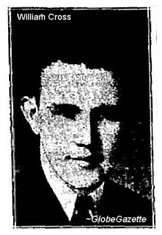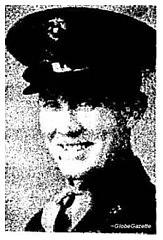One Lad Is “Somewhere,” the Other at San Diego
Two Mason City Youths Joined Marines Year Ago
Just one year ago Tuesday Raymond Beith, son of Mr. and Mrs. F. J. Beith, 623 Sixth street southeast, left Mason City for San Diego, Cal., to join the U. S. marines – fighting force of the navy. With him went William C. Cross, son of Mr. and Mrs. William T. Cross, 233 Sixth street southeast.
Today Raymond – or “Bud” as he is better known – is a corporal and in charge of the base telephone exchange at San Diego.
William is somewhere – just where is a moot question. His parents haven’t heard from him in more than a month. At that time he was off the coast of South Carolina, aboard a destroyer under sealed orders and William himself didn’t know where he was headed. He couldn’t even divulge the name of the destroyer.
It’s the guess of some that he’s now in Iceland with United States troops garrisoning that distant base. Wherever he is, two other Mason City boys who joined the marines at a later date are also with him. They are Tommy Rye and Joe Hearity.
“William is crazy about his work,” Mrs. Cross, his mother says. “He was a first class private the last we knew, and likes the marines just as well as the first day he enlisted.”
Source: The Globe-Gazette, Mason City, Iowa, Tuesday, July 22, 1941, Page 7 (photo included)
![]()
Two Mason Cityans Reach Iceland With Marine Corps
Situation Well in Hand Say Tom Rye and William Cross
"The marines have landed and they have the situation well in hand."
That was the message brought back to Mason City Wednesday from two local members of the marine corps expedition that landed in Iceland July 7.
Letters arrived Wednesday from Thomas Rye and William Cross, the first word received from either since they made a mysterious stop at Charleston, S. Car., June 17, after going through the Panama canal from the marine base at San Diego, Cal.
"We finally got to where we were headed, Iceland," wrote Cross to his parents, Mr. and Mrs. William T. Cross, 233 Sixth street southeast.
Both boys are enjoying their contacts with the English.
We are real friendly with the British soldiers and go over to their canteen quite often," said Cross. "The English soldiers don't make near the money that we do. An English private gets about $1.75 a week, where a private in the marine corps gets about $7.50.
Cross informed his parents he did not know what part of Iceland they occupied.
“We are restricted from going to town and we can’t go more than two miles from camp,” he said.
“We live in little huts that the English turned over to us. It is real nice where our hut is situated. A swell stream runs right by the front door. The creek is full of salmon and trout, but we aren’t allowed to fish it.”
Cross sent his parents a five kronur bill to show what the Icelandic money is like. Six and a half kronur, he explained, make a dollar. Prices in Iceland, he said, are exceedingly high.
“I tried to get a pound note from a British soldier last night, but he couldn’t let me have it,” Cross wrote. “They are afraid the pro-nazis will get it and cash it in for the gold it is worth and send it to Germany.”
Source: The Globe Gazette, Mason City, Iowa, Wednesday, July 30, 1941, Page 1 (photo included)
![]()
Tommy Rye and Bill Cross, two of Mason City’s marines in Iceland, are guarding this distant Atlantic outpost of Uncle Sam, distributing point for supplies to England and outpost for defense against nazi raiders.
Source: Globe-Gazette, Mason City IA – December 31, 1941 (photo included)
![]()
Corporal Cross of Marine Corps Home From Iceland
"Glad to Be Back in States," Says Mason Cityan Warmly
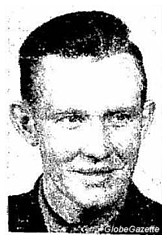
Corp. William Cross, 21, son of Mr. and Mrs. W. T. Cross, 233 Sixth street southeast, who has been serving with the United States marine corps in Iceland, surprised his parents with a sudden appearance at home Monday morning as he began a 15-day leave.
The young Mason Cityan received his promotion to the rank of corporal a few weeks ago. He has been in the marine corps for 23 months, and stationed in Iceland since last July.
Corporal Cross was quite frankly happy about being back in the United States. "It feels good to be home again," he said warmly. He said one of the chief sources of amusement in Iceland was the movies, but that in the city near their station, there were only three movie houses, and it was necessary to get a ticket three days ahead of time, so huge was the demand.
"There are some beautiful girls there," he said, "lots of blonds and redheads. We didn't see much of them, however, for in most instances their parents forbade their going with servicemen."
In Iceland, Cross related, there is not daylight until 10 a.m. and it's dark at 3 p.m. in the winter, while in the summer the sun sets about 10 p.m. and is up again at 2 a.m.
Cross is a graduate of St. Joseph's high school. He received his initial training at the marine corps base in San Diego, Cal.
Source: The Globe Gazette, Mason City, Iowa, Monday, March 30, 1942, Page 11 (photo included)
![]()
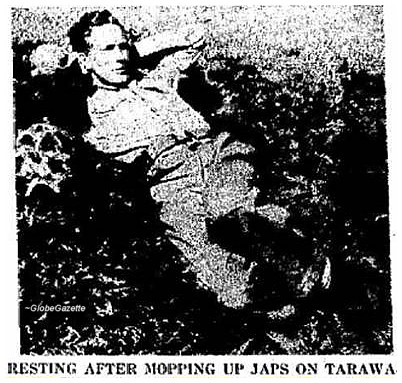
Marine Platoon Sgt. William C. Cross, 23, Mason City, was the non-commissioned officer in charge of the outfit which cleaned up the Jap survivors of the initial attack on Tarawa. After chasing the Jap force for 3 days, Platoon Sgt. Cross' unit outflanked them and with another unit closing in from the opposite flank, annihilated them. He is the son of Mr. and Mrs. William T. Cross, 422 5th S.W. This picture was taken at a rest camp somewhere in the Pacific. (Official U.S. marine corps photo)
Mason Cityan Led Marines to Clear Tawawa of Japs
EDITOR'S NOTE: The following story telling how Marine Platoon Sgt. William C. CROSS, son of Mr. and Mrs. William T. CROSS, 422 5th S.W., and his marine unit cleaned up the last Jap survivors on Tarawa was written by Staff Sgt. Richard J. MURPHY, Jr., of Chevy Chase, Md., a marine corps combat correspondent, and distributed by the Associated Press.
By RICHARD J. MURPHY
Platoon Sgt. William C. Cross, non-commissioned officer in charge of the marine unit, climbed up the sandy, flat atoll after the Japs the day after Botio island was secured.
Reports said that more than a hundred Japs were still alive. The marine outfit spread in a line from beach to beach, combed every hole, every cocoanut tree, in search of the enemy.
They had to wade, sometimes in neck-deep water, from island to island. One estimate said that they had to wade 20 times before they reached the last island in the atoll. There, 4 days after they started their march, the marines flushed the Japs.
Without the elaborate pillboxes and emplacements they had built on Betio, the Japs fought a losing battle from treetops and taro pits - 3 foot deep pits in which the Gilberiese grow taro, a native tuber.
Platoon Sgt. Cross' unit was chosen to out-flank the Japs. Moving up to the end of the island, the outfit swung around, one-half of a pincers. Another marine unit was acting as the other half.
A Jap machine gun help up the advance for a while but 5 marines led by Sgt. Oscar K. ("OK") Moore, 22, Austin, Tex., knocked it out. The whole battle, in which 156 Japs were killed, took 4 hours.
Platoon Sgt. Cross is a former Coca Cola salesman. He has been in service with the marine corps for 4 years.
Source: The Globe Gazette, Mason City, Iowa, Wednesday, March 08, 1944, Page 1
![]()
SOLEMN REQUIEM HIGH MASS HELD FOR SGT. CROSS
Father Vernon Cross, Cousin of Youth Killed in Action, celebrant
Solemn requiem high mass was held at St. Joseph's Catholic church Monday morning in memorial services for Platoon Sgt. William C. Cross, with Father Vernon Cross, Hampton, cousin of the sergeant, celebrant, Father Aloysius Gibbs, deacon, and Father P. J. Behan, sub-deacon, preaching the sermon. The Meyer funeral home was in charge of the services.
"When we try to answer the riddle of life, we're lost and dismayed," spoke Father Cross, "but when we go back to God and realize that right principles are worth dying for, we are consoled. Christ did not hesitate to die for a principle.
"We cannot really separate a true country from the idea of rulership and rulership means authority," said the pastor. "God is the supreme authority and our rules must rule in accordance with the principles of God. It is our business to place in the hearts of young America the principles of upright living. If we fail them in this," concluded the pastor, "we have lost everything."
Platoon Sgt. Cross marine, was killed in action in the performance of his duty serving his country. The time and place of his death has not been disclosed by the war department. He had been in active service 4 years.
Besides his parents, Mr. and Mrs. W. T. Cross, 422 5th S.E., Sgt. Cross is survived by 3 brothers, Tech. Sgt. Richard A. Cross, March field, Cal.; Thomas R. Cross, at home; and J. M. Cross, Austin, Minn.; also a sister, Mrs. John H. Shellington, Arlington, Va.
Out of town relatives in attendance were Mrs. Faye Parkinson, Miss Alice McGee and Mrs. Russell Mitchell, Austin, Minn.
Patriotic organizations represented were as follows: The American Legion with its Auxiliary; the Veterans of Foreign Wars and auxiliary; Navy Mothers; North Iowa Division of Rainbow Division; Daughters of Union Veterans; Veterans of the Spanish American war and the United Service women. Ushers were B. R. Dunn, W. R. Strong and Tim Phalen.
Source: The Globe Gazette, Mason City, Iowa, Monday, July 24, 1944, Page 11
![]()
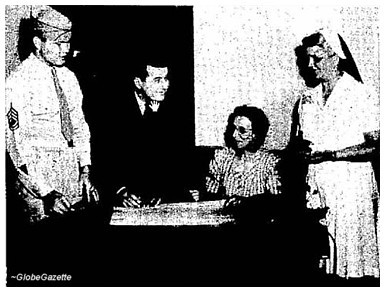
TWO BROTHERS OF MARINE HERO AMONG FIRST TO GIVE BLOOD
Tech. Sgt. Richard A. Cross, stationed at March Field, Cal., and J. M. Cross, Austin, Minn., in Mason City for the memorial services for their brother, Marine Platoon Sgt. William C. Cross, killed in action, were among the first to register as blood donors although they had no appointments. Registrar Mrs. Floyd E. Johnson, shown at desk, is one of the many volunteers to offer their services to the center and was responsible for the 15 minutes periods for all the donors in Mason City. Assisting is Mrs. Mark B. Giere. (Lock photo, Kayenay engraving.)
Source: The Globe-Gazette, Mason City, Iowa, Tuesday, July 25, 1944, Page 1
![]()
Now Told He Met Death on Saipan
Mr. and Mrs. W. T. Cross, 422 5th S.E., have had a letter from the war department stating that their son, Marine Platoon Sgt. William C. Cross, who died in the service of his country, was killed at Saipan on June 15.
In the telegram telling of the death of their son, for whom memorial services were held recently, no mention was made to the Crosses as to the time or place of Sgt. Cross' death.
Marine Platoon Sgt. Cross spent 9 months in Iceland and was there when the war broke out. He was a veteran of Guadalcanal operations and led the platoon that wiped up the Japs on Tarawa.
Source: The Globe-Gazette, Mason City, Iowa, Tuesday, August 08, 1944, Page 14
![]()
Platoon Sgt. William C. Cross of the Marine Corps, son of Conductor W. T. Cross of Mason City, Ia., was killed in action June 15 of Saipan Island. He had served with the marines for four years and was one of the first American troops to land in Iceland.
Source: Milwaukee Road Magazine, September 1944
![]()
Platoon Sgt. William Charles Cross is buried in Elmwood Saint Joseph Cemetery, Mason City, IA.
Source: ancestry.com
![]()
